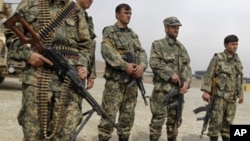In Afghanistan, international development organizations and some businesses must now stop using private companies to provide security for their operations and instead rely on the interior ministry's new Afghan Private Protection Force.
President Hamid Karzai has long been opposed to the large number of private security companies in the country because he says many of them disregard Afghan laws and could grow into private militias. And, there have been cases of contractor abuse ranging from violence to cultural insensitivity that have given the private security industry a bad name among many Afghans.
Karzai set this month as the deadline for private security firms to be replaced with the interior ministry's new Afghan Private Protection Force or APPF. That deadline has been extended for up to 90 days to facilitate the transition. But more than 50 private security companies will be dissolved and more than 10,000 security guards will be re-assigned or replaced.
Brigadier General Carsten Jacobson, spokesman for NATO's International Security Assistance Force, says this is an important milestone in the process of transferring all security responsibilities to Afghan forces before most international combats troops withdraw in 2014.
“The APPF is focusing now on taking over security responsibility for development projects, convoys and commercial businesses," said Jacobson. "By March 2013 all security for ISAF bases and construction sites are scheduled to transition to the APPF.”
Of course the service is not free. Companies and the interior ministry have for months been negotiating how the process will work and how much it will cost. An American company called DAI, Development Alternatives Incorporated, recently made the transition. DAI runs a number of USAID funded projects including one to help farmers improve crop yields and profits as an incentive to turn away from the illicit poppy economy.
DAI's director of communications, Steven O'Connor, says the company uses security guards to protect personnel at a number of offices and compounds throughout the country. He says under the new arrangement with the interior ministry, things are much the same as before. His group was even able to retain the same security guards.
“So we basically contract with the APPF now, but it is the same people," said O'Connor. "They'll go down to get registered at the ministry and they return to work for us under a different heading, under a different title.”
DAI's former private security company, Edinburgh International, will remain involved as a risk management adviser. It will continue to train the guards and will liaison between the company and the interior ministry.
The shift comes at a time of intense anti-American sentiment in Afghanistan following the killing of Afghan civilians by a U.S. soldier and the inadvertent burning of Qurans at an American military base. The Quran burning sparked a week of violent nationwide protests and deadly attacks on U.S. troops.
Some development organizations and private security companies have privately expressed reservations about whether guards working for the Interior Ministry can be trusted to provide the same level of protection and security. And, there are concerns about the potential for patronage and corruption by ministry officials who will have exclusive control of the industry. Already, some organizations are seeing rising costs now that they must pay both the Interior Ministry and risk management companies.
O'Connor says DAI is cautiously optimistic about the new system but will keep a close eye on cost and safety issues.
“We wouldn't be there now if we didn't think this was at least in principle, a workable solution for providing security," he said. "That said, it's an untested solution, meaning we are just getting started. We're going to be extremely vigilant to make sure it does provide that kind of accountability and the same standards we had before."
If security concerns do develop or associated costs increase significantly, private development companies say they will delay or cancel projects which could cost Afghanistan billions in U.S. aid.





